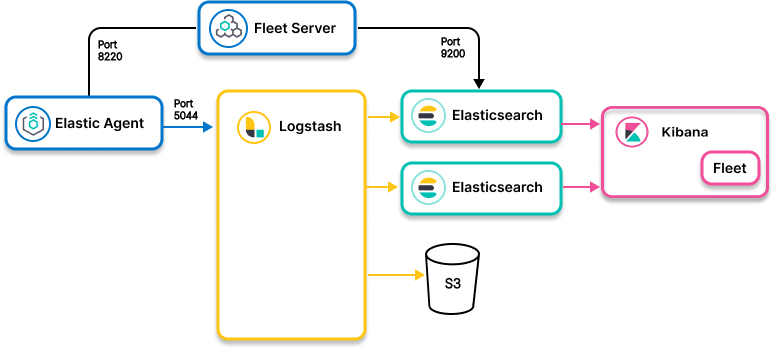IMPORTANT: No additional bug fixes or documentation updates
will be released for this version. For the latest information, see the
current release documentation.
Elastic Agent to Logstash for routing to multiple Elasticsearch clusters and additional destinations
editElastic Agent to Logstash for routing to multiple Elasticsearch clusters and additional destinations
edit
- Ingest model
- Elastic Agent to Logstash to Elasticsearch clusters and/or additional destinations
- Use when
- Data collected by Elastic Agent needs to be routed to different Elasticsearch clusters or non-Elasticsearch destinations depending on the content
- Example
-
Let’s take an example of a Windows workstation, for which we are collecting different types of logs using the System and Windows integrations. These logs need to be sent to different Elasticsearch clusters and to S3 for backup and a mechanism to send it to other destinations such as different SIEM solutions. In addition, the Elasticsearch destination is derived based on the type of datastream and an organization identifier.
In such use cases, agents send the data to Logstash as a routing mechanism to different destinations. Note that the System and Windows integrations must be installed on all Elasticsearch clusters to which the data is routed.
- Sample config
-
input { elastic_agent { port => 5044 } } filter { translate { source => "[http][host]" target => "[@metadata][tenant]" dictionary_path => "/etc/conf.d/logstash/tenants.yml" } } output { if [@metadata][tenant] == "tenant01" { elasticsearch { cloud_id => "<cloud id>" api_key => "<api key>" } } else if [@metadata][tenant] == "tenant02" { elasticsearch { cloud_id => "<cloud id>" api_key => "<api key>" } } }
Resources
editInfo on configuring Elastic Agent:
Info on Logstash and Logstash outputs:
Info on Elasticsearch: